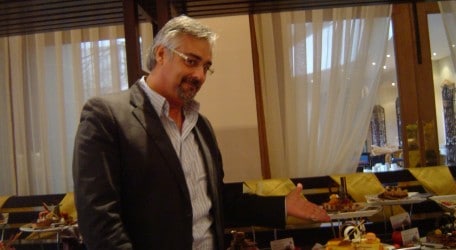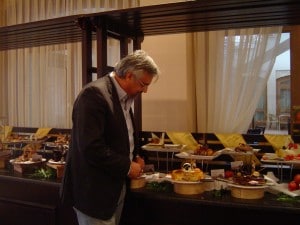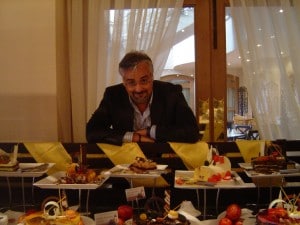
Josef Bonello at The Terrace, The Westin Dragonara Resort, St Julian’s
Dr Frendo was simply explaining the legal differences between separations and annulments, when Josef suddenly heard the instructions in his earpiece to go to commercial because PBS was going to pull them off the air.
Like countless media people whom I have interviewed, the confident public persona of Josef Bonello is a camouflage for a more introspective soul.
We are here at the Westin for their legendary Sunday lunch buffet. This is not a lunch which you book if you are only in the mood for a light meal – you are advised to bring a hearty appetite if you are serious about really tasting all the tempting dishes they have to offer. The well-informed staff take us round all the stations explaining each dish in detail so that we are well-prepared for the difficult task of choosing what we want. As Josef is the editor of Cibus, the food magazine, this was an appropriate place to hold our interview.
Josef is a San Alwigi Old Boy, and immensely proud of that fact. I am always intrigued by the fierce loyalty of these old school ties. “My experience there was balanced from an academic point of view,” he tells me. “Although we may not have had the best teachers or the best sports facilities, they concentrated very much on building our character.”
And what does having character mean in today’s world?
He bursts into laughter, and I can’t help but join him (we are both keenly aware of the loaded irony of that question).
“I think character is what distinguishes your worth – even if you are the least educated person on earth, if you have character it gives you a different dimension; much like wine. Integrity, trustworthiness, an appreciation of what a human person can be – that, to me, is character.”
As if on cue, at that precise moment our affable waiter pours us a glass of Merlot from the Tarapacá region of Chile.
“Right now, we have a dearth of leaders, whether from the political, religious or business point of view. Look at the people who are at the forefront: they do not have a leadership grip on their behaviour or their style – we have no leaders to inspire us. Who in Malta would you stop and listen to because what he or she says might influence your behaviour?” he challenges me in return.
I have to admit he’s right: I can’t think of anyone.
“I’m a firm believer in the freedom of thought and expression, but you also have a duty to look towards people who will help you mould your opinion, maybe not change it, but to provide you with a space for you to challenge your thoughts. If you have a right to say something, it doesn’t mean you’re right. You need to have the space to change your mind!”
Again, I find myself in agreement. Why do people find it so hard to admit that they were wrong?
“Exactly; why do political parties accuse each other of making a U-turn? On the contrary, I appreciate people who can say ‘yes, that was the turn I took, but I’m going to change because it was wrong’. We need more maturity.”
Looking back at his childhood, Josef says he was very timid, which for someone who is quite tall, is an odd combination.
“I didn’t even have a girlfriend until I was 16; I was very insecure. I still am, but I hide it a lot better than I used to. In fact, my family was very surprised when they saw me up on stage with Voices the first time.”
When a group of fellow San Alwigi students decided to form a choir, he became involved in Voices as a singer, which lasted until he and his wife had their two children, and the commitment of the rehearsals became too much. Then, in his 20s, he was talked into presenting Voices by the charismatic and persuasive, the late Louis Naudi.
The first time he presented the show he was such a bag of nerves that he was seriously contemplating crashing his car deliberately as a good enough excuse not to show up for the performance. Needless to say he didn’t crash his car, he was a great presenter and today Josef has become inextricably linked to Voices. These days he shares the limelight with comedian Ronnie Briffa, an inspired relationship which works because of the undeniable chemistry between the two of them (and because Josef is gracious enough to accept being the butt of Ronnie’s jokes).
Meanwhile, with the arrival of a fresh new TV station called Max Plus, launched by Claudette Pace, Peter Fleri Soler and Ray Calleja in 1999, Josef really came into the public domain. As usual for him, he was thrown in at the deep end.
“Originally they told me it would be recorded, and at the last minute, Ray told me it would be live. I could have killed him,” he chuckles good-naturedly.
That programme was L-Avukat tax-Xitan, an innovative interview series. Because of the title, to this day some people still assume that Josef is a lawyer.
The relationship with Ray continued over the years with further collaborations – few people are aware, for example, that it is Josef Bonello who used to write the scripts for the comic characters made famous by Ray Calleja in Bomba and in U l-kotra qamet u ghajtet.
Unlike many people, Josef has never pushed and elbowed his way into anything – it is not just his style.
“I have to feel confident before I accept to do something, but I have found that that approach keeps you back. Sometimes you need to try new things, but I always have doubts and I have had let these doubts take over in the past.”
One project which he does not regret turning down is the new version of the PBS breakfast show which is now more newsy and full of political analysis. He politely declined the offer, as he was much happier presenting Bongu the way it used to be; a light programme with the occasional serious topic, but which wakes people up gently in the morning. “Above all, viewers loved the banter I used to have with the puppet, Ic-Chief. People still stop me in the street telling me how much they used to enjoy it.”
Josef’s first real job at the age of 19 was as an accounts clerk at a concrete ready-mix company in Hal-Far. “I used to have to take three buses, starting at 6am from Sliema to get to Hal-Far, and I would arrive home at 6pm, but it was a good experience. Then I saw a vacancy for an accounts clerk with a firm in Gzira, and even though it was for less pay I applied, because it was closer to home. However, they phoned me and asked me whether I would like to be a salesman instead, and I said, ‘who me?’ But I took it and that was probably one of the most important steps I ever took in my life because it meant I started dealing with people, something I still enjoy to this very day.”
Life is like that sometimes – an unexpected phone call, a leap of faith in yourself and your path changes forever. That is how Josef discovered he had a flair for selling. He then went on to join Marsovin as a sales rep, moving on to become marketing manager.
“I realized I enjoy listening to people when I was trying to sell them something and understanding what they really want. What I have learnt about myself is that, despite my stature, I don’t intimidate people. I’m very conscious of my size when I walk into a room, so it has probably forced me to adopt a very unassuming approach. And this, I’ve also learnt, works a lot on TV because it has brought out the best in my guests.”
He quips that his life has been a series of ‘accidents’, starting from his birth, since he was born when his older sisters were already 15 and 17. His introduction to wine, which has become his passion, was also an accident.
“Wine was just one of the many products in my portfolio, but the directors soon realized that I had a particular flair when I came to talk about wine. Now this was at a time when you wouldn’t dare be caught drinking a Maltese wine in public and yet I fell completely in love with it.”
Josef read everything he could on the subject, so he was basically self-taught, but it was when he moved to Wands, who were importers of international brands, that the whole world of wine opened up to him.
“I’m not a connoisseur or a sommelier, I’m a wine communicator. I like bringing wine and people together.”
There were other jobs after that, including a stint with Camilleri wines, but in the meantime his introduction to television meant he was being approached for other programmes as well. At one point he got a call from John Inguanez from PBS who asked him if he would be interested in doing a primetime discussion programme.
Josef came up with the idea of a Vis-à-Vis in which well-known people were interviewed alongside their relatives.
“I remember once I had Norman Hamilton with Josette Grech and their two daughters, and it was incredible how they started sharing their feelings there and then, as I sat back and watched; I was just the facilitator. The classic episode though was definitely when I interviewed (former PN general secretary) Joe Saliba with his wife and daughters. His older daughter was a University student at the time, and I asked her whether she had faith in politicians and she bluntly said ‘No, xejn!’ Joe then tried to ‘explain’ what his daughter was trying to say, and I said, ‘I think she knows perfectly well what she’s saying’. It was amazing television. It was a makeshift set, we had no budget, but it worked.”
There was a gap when Josef did not appear on TV at all, then he came back with a few programmes such as Illejla Illejla, and a debate programme called Hu Hsieb (Education 22). With Bongu, Josef was on our screens again, every morning for over two years, helping to make the breakfast show one of the most popular of PBS’ line-up.
“It was not easy because I was asked to replace John Bundy at short notice after he and Dee Media had a disagreement. It was awkward at first, but I did not ‘take’ the programme away from him, I was asked to do it. Finally, I realized I just had to be myself and create my own style. Today I am pleased to say that John and I are on good terms.”
Bongu brought out another side of Josef because he became quite astute at asking the questions the public were asking even on heavy, political subjects. He could then segue just as smoothly into a light-hearted segment about hair and make-up and somehow pull it off as well, which is not easy. Above all, he was not averse to simply saying, ‘I’m sorry, I didn’t understand that point’, especially when speaking about complicated legal subjects with a notary or a lawyer.
But it was during a segment with Dr Ramona Frendo during the heated divorce referendum, that Josef experienced a form of censorship for the first time. Dee Media as the producers had decided to steer clear of the divorce topic because it was impossible to maintain the type of balance for and against the issue that the Broadcasting Authority and PBS were demanding. Dr Frendo was simply explaining the legal differences between separations and annulments, when Josef suddenly heard the instructions in his earpiece to go to commercial because PBS was going to pull them off the air.
“I do not know why we were given those instructions,since the subject matter was strictly referring to separation from a legal point of view and where the word ‘divorce’ was never even mentioned.”
This season, Josef Bonello is on a political station for the first time in his life, on Net TV, with Bejni u Bejnek (a daily interview programme) and Kontra l-Hin, the quiz show made popular by Carlo Borg Bonaci.
With interviews, Josef is in his element, because he is genuinely interested in people and above all, he’s a good listener.
“The nature of the programme is that I ask Spartan, innocuous questions, like what’s your favourite colour, and from that a whole conversation can develop.”
It was during one of these conversations when Josef was interviewing Lou Bondi, that Lou came out with certain statements which, unnecessarily in my opinion, became headlines.
I said, tell me something about God. When Lou replied very frankly, ‘God doesn’t exist’, I wasn’t expecting it, but I found it interesting.”
“I asked him two questions: who are you going to vote for? Because I think all this secretive behaviour about our political beliefs is silly. And then I said, tell me something about God. When Lou replied very frankly, ‘God doesn’t exist’, I wasn’t expecting it, but I found it interesting.”
Josef doesn’t understand why the Labour party has made such an issue about Lou’s atheism, when it professes to be so progressive. He also does not agree with PBS’ stand that a presenter cannot state his political views.
“I think the man-in-the-street prefers that kind of honesty rather than not knowing where a presenter stands. Personally, however, I have always felt my role to be as someone who brings out what my guest wants to say; I do not want to be the one doing all the talking, because it’s not about me. The limelight should not be on the presenter, because that is not the point of a discussion.”
His many conversations with doctors during Bongu immediately alerted to him the fact that he was probably suffering from angina, a blocked artery.
A life-changing experience happened to him last summer when he felt a heavy feeling of discomfort in his chest while out walking. His many conversations with doctors during Bongu immediately alerted to him the fact that he was probably suffering from angina, a blocked artery. His doctor immediately sent him to the emergency department and he ended being under the care of consultant Robert Xuereb, the very doctor who often appeared on Bongu. Josef was informed that he had to be checked into hospital right there and then in order to have a stent inserted into his artery.
“So picture this. My wife was abroad, my sons were at home on school holidays and I had two students whom we were hosting, who were to leave the next day – and I hadn’t told anyone anything yet! They slapped an aspirin patch on me to thin the blood so that I could sort everything out and I was admitted the next morning.”
The stent was inserted through his thigh under local anesthetic with Josef fully conscious; he watched the entire procedure, but he didn’t feel a thing. A stand-by surgical team led by Alex Manche was standing by just in case something went wrong and he needed urgent bypass surgery. Luckily, the stent was successful.
Josef’s angina was brought on due to stress and being overweight – two things which he has been advised to “take care of”, but which he admits is easier said than done.
When I ask him about his two sons, Julian aged 20 and Jeremy aged 18, Josef smiles tenderly. “My boys”, he says, clearly moved.
“Instinctively you love your children because they are part of you, but then you grow to love them as they get older for who they become. They take the Mickey, of course, because wherever we go, people are always staring or coming up to talk to me. I’m not the type of parent who says they are my friends, they have enough friends, I’m their father. I’d rather they hate me, rather than giving in to them all the time, just so that they like me. At least I know that I did what I could to bring them up well. I’m open-minded but at the same time I believe there still needs to be respect for authority.”
WHAT WE HAD FOR LUNCH
Variety of appetizers
Skewers of pork and lamb
Coq au vin
Steamed vegetables
Roast potatoes
Skewered prawns and sardines
Fuselli, basil, tomato sauce, pine nuts
For dessert
Brownie with snickers and Baileys
Cheesecake
- November 2, 2011 3 Comments Posted in: Let's do Lunch







